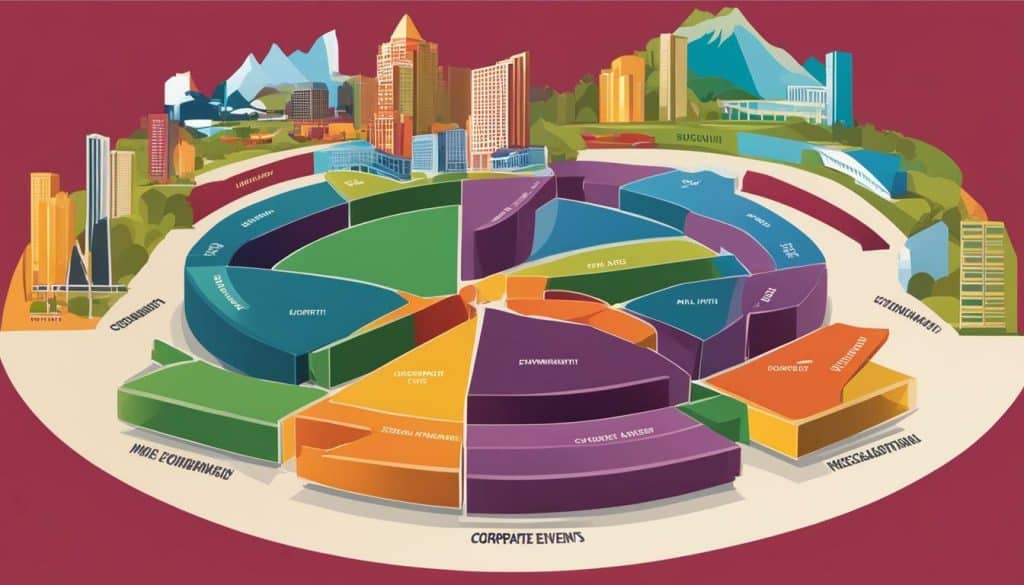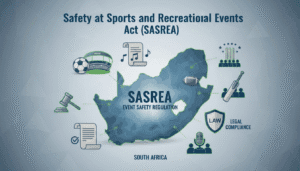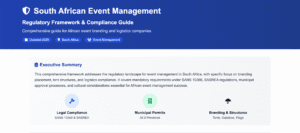Budgeting for corporate events is a crucial aspect of event planning in South Africa, as it allows for effective cost control and ensures the success and memorability of the event. To master this skill, it is important to consider various factors in the budgeting process. By carefully planning and allocating resources, you can create a well-managed budget that maximizes stakeholder value and delivers a remarkable event experience.
In this section, we will explore key tips and strategies to help you navigate the world of budgeting for corporate events. From designing a realistic budget and seeking sponsorships to choosing cost-effective food styles and aligning the event with stakeholders’ goals, we will provide you with valuable insights that will enhance your event planning skills.
Key Takeaways:
- Design a realistic budget by allocating costs wisely to different event aspects.
- Seek sponsorships to offset costs and promote brands.
- Opt for budget-friendly food styles, such as buffet-style meals, to save costs.
- Align the event with stakeholders’ goals to ensure their objectives are met.
- Utilize effective advertising channels to attract potential attendees.
Designing a Realistic Budget for Corporate Events
To effectively budget for corporate events, it is essential to design a realistic budget that carefully considers the costs associated with various event aspects. Here are some key tips to help you create a budget that meets your needs and maximizes your resources. Consider utilizing event budgeting techniques and tips such as breaking down costs into categories like venue, catering, and entertainment to ensure no detail is overlooked. Additionally, setting aside a contingency fund for unexpected expenses can provide peace of mind and financial flexibility. Regularly reviewing and adjusting your budget will help keep you on track and ensure you stay within your financial constraints.
1. Determine your budget: Before you start planning your corporate event, it is crucial to determine the budget you have available. This will help you make informed decisions and allocate funds to different event aspects effectively. Consider factors such as venue rental, catering, audiovisual equipment, decorations, and entertainment.
2. Allocate costs wisely: Once you have a budget, it’s important to allocate costs wisely to ensure you stay within your financial limits. Create a spreadsheet or use a budgeting tool to track your expenses and allocate funds to different aspects of the event. This will help you prioritize and make informed decisions about where to invest your resources.
3. Consider cost-saving options: Look for opportunities to save costs without compromising the quality of your event. For example, consider using buffet-style meals instead of sit-down dinners with wait staff. This can save money on catering without sacrificing the overall dining experience. Keep your food arrangements simple and avoid unnecessary complications.
4. Create a contingency fund: To prepare for unforeseen circumstances or unexpected costs, it’s important to create a contingency fund within your budget. Set aside a portion of your budget that can be used as a backup in case of emergencies or last-minute changes. This will help you address any unexpected expenses without jeopardizing the success of your event.
Sample Budget Allocation:
| Event Aspect | Allocated Budget |
|---|---|
| Venue Rental | $5,000 |
| Catering | $3,000 |
| Audiovisual Equipment | $2,500 |
| Decorations | $1,500 |
| Entertainment | $3,000 |
| Contingency Fund | $2,000 |
| Total | $17,000 |
Remember, designing a realistic budget is a critical step in the event planning process. It allows you to effectively manage your resources, stay within your financial limits, and ensure a successful and memorable corporate event.

Seeking sponsorships for corporate events can significantly help offset costs and provide valuable brand promotion opportunities. By partnering with sponsors, you can reduce the financial burden of organizing a successful event while also gaining exposure and visibility for your brand.
To secure event sponsors, it is essential to propose your event plan effectively and highlight the benefits they will receive in return. Start by identifying potential sponsors whose target audience aligns with your event’s attendees. This alignment increases the chances of a successful partnership, as sponsors can leverage the event to promote their brand to a relevant and engaged audience.
When approaching prospective sponsors, emphasize the unique selling points of your event, such as the number of expected attendees, the quality of speakers, or the specific theme that sets your event apart. Make a compelling case for why sponsoring your event will provide them with valuable brand exposure and create positive associations with their target market. You can also offer various sponsorship packages tailored to different budgets, ensuring that there are options available for both small and large organizations.
Once you’ve secured sponsorships, be sure to fulfill your end of the agreement by prominently displaying sponsors’ logos and branding throughout the event. This helps raise brand awareness and reinforces the partnership between your event and the sponsors. Additionally, consider organizing dedicated sponsor recognition activities or spaces where sponsors can directly engage with attendees, further enhancing their brand visibility and promoting positive brand associations.
| Sponsorship Benefits | Brand Promotion Opportunities |
|---|---|
| Financial support to offset event costs | Increased brand visibility among target audience |
| Access to a captive audience during the event | Opportunity to showcase products or services |
| Positive brand associations with a successful event | Potential media coverage and PR opportunities |

By actively seeking sponsorships for your corporate events, you can create a win-win situation where sponsors benefit from increased brand exposure, and you receive valuable financial support. Remember to provide sponsors with clear and compelling incentives, fulfill your sponsorship obligations, and build long-term relationships with sponsors for future events. With effective sponsor partnerships, you can successfully offset costs and create memorable events that leave a lasting impact on attendees and stakeholders.
Opting for Budget-Friendly Food Styles
When budgeting for corporate events, opting for budget-friendly food styles, such as buffet-style meals, can help save costs without compromising on quality. Buffet-style meals offer a cost-effective option that allows attendees to choose from a variety of dishes, ensuring everyone’s preferences are met.
By serving buffet-style meals, you can avoid the costs associated with hiring additional waitstaff and organizing complicated food arrangements. The simplicity of buffet-style meals not only saves money but also reduces the risk of food wastage, as attendees can serve themselves according to their own appetites and dietary preferences.
| Advantages of Buffet-Style Meals | Budget-Friendly Alternatives |
|---|---|
| ✓ Flexibility: Buffet-style meals allow guests to choose their own portions and customize their plates according to their preferences. | ✓ Potluck Style: Consider asking attendees to bring their favorite dish, turning the event into a potluck-style gathering. |
| ✓ Reduced Staffing Costs: Buffet-style meals eliminate the need for additional waitstaff, resulting in significant cost savings. | ✓ Food Stations: Set up food stations with different cuisines or themes, reducing the need for a variety of dishes on the buffet table. |
| ✓ Minimized Food Wastage: With buffet-style meals, guests can choose the quantity and variety of food they desire, reducing food wastage. | ✓ Food Trucks: Consider hiring food trucks that offer a range of affordable and unique dining options. |
When planning buffet-style meals, it is essential to consider dietary restrictions and preferences of the attendees. Providing a diverse range of options, including vegetarian, gluten-free, and vegan dishes, ensures that all guests can enjoy the event without any limitations.
By opting for budget-friendly food styles like buffet-style meals, you can allocate your event budget more efficiently, allowing you to invest in other aspects of the event, such as entertainment or venue enhancements. Remember, a successful corporate event is not just about the food but also about the overall experience it offers to attendees.

When planning a corporate event, it is essential to align the event with stakeholders’ goals by carefully selecting guest speakers and choosing a venue that reflects their objectives. This ensures that the event not only meets the organization’s objectives but also resonates with attendees and creates a lasting impression.
To successfully align the event with stakeholders’ goals, consider inviting guest speakers who are experts in their fields and can convey valuable insights related to the event’s theme. These speakers should have a deep understanding of the organization’s vision and mission, and their presentations should be engaging, informative, and relevant to the attendees.
Furthermore, selecting an appropriate venue plays a significant role in aligning the event with stakeholders’ goals. The venue should be suitable for the event’s purpose and theme, creating an atmosphere that enhances the overall experience. For example, hosting a technology-focused event in a modern and innovative venue would align with stakeholders’ goals of showcasing cutting-edge solutions and advancements.

| Key Points | Benefits |
|---|---|
| Inviting guest speakers with expertise | Provides valuable insights and enhances attendees’ knowledge |
| Choosing a suitable venue | Creates an atmosphere that aligns with stakeholders’ goals |
By aligning the event with stakeholders’ goals through the selection of guest speakers and an appropriate venue, you can create an event that not only meets their expectations but also leaves a lasting impact on attendees. Remember, a well-executed event that is aligned with stakeholders’ goals not only promotes their objectives but also enhances the organization’s reputation and strengthens relationships with key stakeholders.
Effective Advertising for Corporate Events
Promoting corporate events through strategic advertising channels is crucial to maximize attendance and create buzz among potential guests. With the rise of digital platforms and the increasing reliance on virtual communication, leveraging e-vites, social media, and other online advertising tools has become essential in reaching a wider audience and generating excitement for your event.
When it comes to event promotion, e-vites are an efficient and cost-effective way to reach out to your target audience. Craft an engaging invitation that highlights the key aspects of your event, such as the date, time, venue, and any special guests or speakers. Personalize the e-vite to make it more appealing, and include a clear call-to-action that encourages recipients to RSVP and share the invitation with their networks.
Social media platforms are also valuable tools for event promotion. Create eye-catching posts that showcase the unique features of your event, including images, videos, and compelling captions. Utilize relevant hashtags, tag influential individuals or organizations, and encourage followers to engage with your content by liking, sharing, and commenting. Additionally, consider running targeted ads on social media platforms to reach a broader audience and increase event awareness.
| Benefits of Strategic Advertising | Tactics |
|---|---|
| Increased Attendance: | By effectively promoting your event through strategic advertising, you can attract more attendees and maximize the impact of your corporate gathering. |
| Enhanced Brand Visibility: | Using e-vites, social media, and other advertising channels allows you to create buzz around your event, increasing brand visibility and leaving a lasting impression. |
| Targeted Audience Reach: | Digital advertising tools enable you to target specific demographics and reach individuals who are more likely to be interested in your event, increasing the quality of leads generated. |
| Cost-Effective Promotion: | Compared to traditional advertising methods, online platforms offer cost-effective solutions that allow you to allocate your budget more efficiently. |
Remember to analyze your advertising efforts and track metrics such as engagement rates, click-through rates, and RSVPs. This data will provide valuable insights into the success of your advertising campaigns and help you make informed decisions for future event promotions. By utilizing strategic advertising techniques, you can ensure your corporate event receives the attention it deserves, driving attendance and creating a memorable experience for all.

To create a memorable experience for attendees, it is important to organize seating arrangements that recognize employee achievements, choose a comfortable venue, and show appreciation towards spouses. Employee recognition plays a significant role in boosting morale and fostering a positive company culture. By arranging seating according to departments or teams, attendees will feel acknowledged for their hard work and dedication. This not only enhances engagement but also encourages networking and collaboration among colleagues.
When selecting a venue for your corporate event, prioritize the comfort of your guests. A comfortable and inviting setting can significantly impact their overall experience. Choose a venue that offers adequate seating, good lighting, and a pleasant ambiance. Additionally, consider the accessibility of the venue to ensure convenience for all attendees, especially those with special needs. A comfortable and accessible venue sets the tone for a successful event and demonstrates your commitment to providing a memorable experience.
Spouse appreciation is another crucial aspect to consider when organizing a corporate event. Many attendees may bring their spouses or partners, and recognizing their presence can contribute to a positive and inclusive atmosphere. Consider incorporating activities or gestures that honor the contributions of spouses, such as providing a designated spouses’ lounge area or arranging surprise tokens of appreciation. Making everyone feel valued and included enhances the overall experience and leaves a lasting impression.
Recognizing Employee Achievements
| Seating Arrangements | Benefits |
|---|---|
| Create designated sections for different departments or teams. | Enhances employee recognition, collaboration, and networking opportunities. |
| Arrange seating based on employee achievements or years of service. | Motivates employees and boosts morale. |
| Incorporate interactive elements like icebreakers or team-building activities. | Fosters a positive and engaging environment. |

Recognizing employee achievements can enhance engagement and boost morale.
Keeping Attendees Engaged and Interested
To ensure attendees remain engaged and interested throughout the event, it is important to incorporate interactive sessions, entertainment elements, and create an atmosphere that energizes the crowd. Interactive sessions provide an opportunity for participants to actively participate, share their thoughts, and engage with the content being presented. This can be achieved through interactive workshops, panel discussions, or Q&A sessions. By encouraging audience involvement, you create a dynamic environment that keeps attendees interested and invested in the event.
Entertainment elements play a vital role in capturing and maintaining attendees’ attention. Incorporating live performances, music, or even visual displays can add excitement and variety to the event. These elements create memorable experiences for guests, ensuring they have a positive impression of the event and remain engaged throughout.
To further enhance the crowd’s energy, it is essential to create an atmosphere that fosters interaction and conversation. Utilize seating arrangements that encourage networking and collaboration. Consider providing designated areas for attendees to socialize and connect with one another. This can be done through lounge areas or interactive exhibits where guests can engage with different activities.

By incorporating interactive sessions, entertainment elements, and creating a vibrant atmosphere, you can ensure that attendees remain engaged and interested throughout your corporate event. This will contribute to a memorable experience for your guests and leave a lasting impression.
Showing Appreciation and Gathering Feedback
Show your gratitude to attendees, gather feedback, and provide tokens of appreciation to ensure a positive attendee experience and improve future corporate events. Showing appreciation for their participation is essential in building strong relationships and increasing attendee satisfaction.
At the end of the event, take the time to thank each attendee personally. Simple gestures such as a genuine handshake or a heartfelt thank-you note can go a long way in making attendees feel valued. Consider incorporating personalized souvenirs or gift bags as a token of appreciation. These small gestures can leave a lasting impression and create a positive association with your brand.
Feedback from attendees is invaluable in improving future events. Create a feedback mechanism, such as an online survey or a suggestion box, where attendees can share their thoughts and suggestions. This feedback will provide insights into what worked well and what can be improved, helping you enhance the overall event experience.
Additionally, use this opportunity to gather testimonials or quotes from attendees about their positive experiences throughout the event. These quotes can be used for future marketing efforts and to highlight the success of your corporate events.
Remember, showing gratitude and gathering feedback are crucial steps in creating a memorable event experience, fostering attendee loyalty, and continuously improving your event planning processes. By implementing these practices, you can ensure that your corporate events leave a lasting impact on attendees and stand out as exceptional experiences.
Attendee Appreciation and Feedback Process
| Step | Action |
|---|---|
| 1 | Show personal appreciation: Thank each attendee individually, either through a handshake or a thank-you note. |
| 2 | Provide tokens of appreciation: Consider personalized souvenirs or gift bags as a gesture of gratitude. Include branded items to create a lasting brand association. |
| 3 | Gather feedback: Create a feedback mechanism, such as an online survey or suggestion box, to collect attendees’ thoughts and suggestions. |
| 4 | Use testimonials and quotes: Collect positive testimonials and quotes from attendees to showcase the success of your corporate events in future marketing efforts. |

By following these steps, you can ensure that your corporate events not only meet the expectations of attendees but exceed them, leaving a lasting impression and setting the stage for successful future events. The attendee experience is key to the overall success of your corporate events, and showing appreciation and gathering feedback play a crucial role in creating a positive and memorable event atmosphere.
Conclusion
Effective event budget management plays a vital role in successful corporate event planning, reducing unnecessary expenses, improving event planning processes, and showcasing the value and performance of the event to stakeholders. By following these key tips, you can master the art of budgeting for corporate events and ensure the success of your next event in South Africa.
First and foremost, it is crucial to design a realistic budget by determining the allocated funds before planning the event. Allocate costs wisely to different aspects such as speakers, venue, entertainment, food, and decorations. This will help you stay within your budgetary constraints and ensure a well-balanced event.
Seeking sponsorships is another important strategy to offset costs and promote brands. Propose your event plan to prospective sponsors, highlighting the benefits they can gain from aligning with your event. This will not only reduce financial burden but also enhance the overall value and reach of your event.
When it comes to selecting food arrangements, opting for budget-friendly buffet-style meals can save costs and simplify the overall planning process. Keep the event goals in mind and align your choices with stakeholders’ objectives. Additionally, organizing effective advertising for your event through e-vites, social media, and other platforms will help attract potential guests and ensure a successful turnout.
Creating a memorable experience for attendees is essential. Recognize and appreciate employees by arranging seating arrangements that highlight their contributions. Choose a comfortable venue that caters to the needs of your guests, ensuring their satisfaction and engagement throughout the event. Keep the sessions short and interactive, incorporating entertainment elements to maintain an enjoyable atmosphere and spark conversations among attendees.
Lastly, show your gratitude to the attendees by expressing thanks and collecting valuable feedback. This feedback will help you improve future events and demonstrate your commitment to delivering exceptional experiences. Consider providing souvenirs or gift bags as a token of appreciation, leaving a lasting impression on your guests.
Remember, effective event budget management starts with advanced planning, securing sponsors early, and creating a contingency fund for unforeseen circumstances. By implementing these strategies and managing your budget wisely, you can achieve a successful corporate event that exceeds stakeholders’ expectations and generates long-term value.
FAQ
What is the importance of mastering budgeting for corporate events?
Mastering budgeting for corporate events is crucial for organizing successful and memorable events.
How should I design a realistic budget for a corporate event?
Determine the budget before planning the event and allocate costs wisely to different aspects such as speakers, venue, entertainment, food, and decorations.
What are some tips for seeking sponsorships to offset costs?
Propose the event plan to prospective sponsors to promote their brand in return for offsetting costs.
How can I save costs on food for a corporate event?
Opt for budget-friendly buffet-style meals rather than sit-down meals with waiters and keep the food arrangements simple.
What should I consider when aligning the event with stakeholders’ goals?
Identify the stakeholders’ goals for the event and plan accordingly by inviting relevant guest speakers and securing an appropriate venue.
How can I effectively promote a corporate event?
Promote the event through e-vites, social media, and other advertising channels to attract potential guests.
How can I create a memorable experience for attendees?
Arrange seating arrangements to recognize and appreciate employees’ hard work, select a comfortable venue, and honor the contributions of spouses.
What can I do to keep attendees engaged and interested during a corporate event?
Avoid long and monotonous sessions by incorporating breaks and activities, as well as including entertainment elements to energize the crowd.
How can I show appreciation to attendees and gather feedback?
Show gratitude to the attendees, collect feedback to improve future events, and consider providing souvenirs or gift bags as tokens of appreciation.
What is the significance of effective event budget management?
Effective event budget management reduces unnecessary expenses, improves event planning processes, and demonstrates the event’s value and performance to stakeholders.
What Are the Key Factors to Consider When Evaluating Corporate Events?
When evaluating corporate events, several key factors should be taken into consideration. Firstly, the purpose and goals of the event must align with the company’s objectives. Secondly, the target audience and their preferences should be well understood to ensure the event meets their expectations. Additionally, budgetary constraints, logistics, and potential return on investment are essential aspects to evaluate while planning and executing corporate events. By carefully considering these factors, companies can ensure successful and impactful evaluating corporate events.




